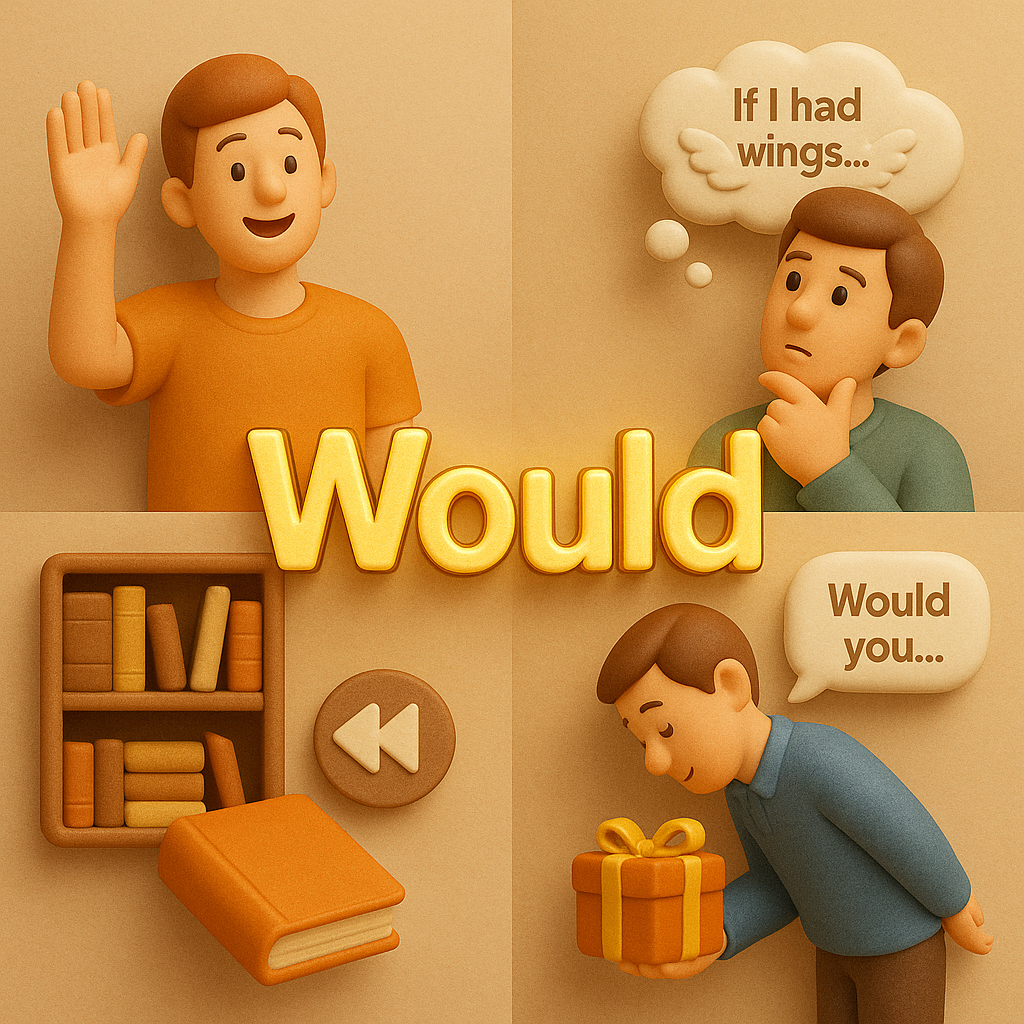Would
Definition
Would is an auxiliary verb used to indicate willingness, hypothetical situations, past habits, or politeness in requests. It is the past tense form of "will" in reported speech or conditional statements.
Parts of Speech
- Auxiliary Verb
Pronunciation
American English
- IPA Pronunciation: /wʊd/
- Respelling: WUHD
British English
- IPA Pronunciation: /wʊd/
- Respelling: WUHD
Etymology
The word "would" originates from Old English "wolde," the past tense of "willan," meaning "to wish or desire." It is derived from Proto-Germanic "*wald-" and Proto-Indo-European "*welh₁-," meaning "to will" or "to choose."
Derivatives
- Would-be (adjective)
- Wouldn’t (contraction)
- Woulding (noun, rare)
- None
- None
Synonyms
- Could
- Might
- Should (context-dependent)
Antonyms
- None
Usage
The auxiliary verb "would" is widely used in conditional sentences, as in "If I were you, I would accept the offer." It is also used to express politeness: "Would you mind helping me?"
Related Terms
- Will: The present tense form of "would."
- Could: Indicates possibility or ability in the past.
- Should: Expresses obligation or recommendation.
Detailed Definitions
Auxiliary Verb
- Used to express hypothetical or conditional situations: Refers to events dependent on certain conditions.
- Example: "I would go if I had more time."
- Indicates willingness or preference: Describes a person’s inclination.
- Example: "He would always help his friends."
- Expresses politeness in requests or offers: Used to soften statements or inquiries.
- Example: "Would you like some tea?"
- Represents reported speech or indirect statements: Refers to a future action in the past tense.
- Example: "She said she would arrive late."
would



🇨🇳 Mandarin Chinese
- 会 (would, expressing future possibility)
- IPA: /xaɪ̯/
- English Respell: huì
- 要是…就 (would, in conditional sentences)
- IPA: /jaʊ̯ ʂɹ̩…tɕjɔʊ̯/
- English Respell: yàoshi…jiù
🇮🇳 Hindi
- होगा (would, expressing future possibility)
- IPA: /ɦoːgaː/
- English Respell: hoga
- अगर...तो (would, in conditional sentences)
- IPA: /əɡər...toː/
- English Respell: agar...to
🇪🇸 Spanish
- Haría (would, expressing conditional mood)
- IPA: /aˈɾia/
- English Respell: haría
- Si…entonces (would, in conditional sentences)
- IPA: /si...enˈtonses/
- English Respell: si…entonces
🇫🇷 French
- Aurait (would, expressing conditional mood)
- IPA: /oʁɛ/
- English Respell: aurait
- Si...alors (would, in conditional sentences)
- IPA: /si...alɔʁ/
- English Respell: si...alors
🇦🇪 Arabic (Modern Standard)
- سيكون (would, expressing future possibility)
- IPA: /sajakuːn/
- English Respell: sayakūn
- لو…ثم (would, in conditional sentences)
- IPA: /luː...ðumma/
- English Respell: law...thumma
🇧🇩 Bengali
- হবে (would, expressing future possibility)
- IPA: /ɦobe/
- English Respell: hobe
- যদি...তবে (would, in conditional sentences)
- IPA: /ɟodi...tobe/
- English Respell: jodi...tobe
🇷🇺 Russian
- Бы (would, expressing conditional mood)
- IPA: /bɨ/
- English Respell: by
- Если…то (would, in conditional sentences)
- IPA: /ˈjeslʲi...to/
- English Respell: yesli...to
🇵🇹 Portuguese
- Seria (would, expressing conditional mood)
- IPA: /sɨˈɾi.ɐ/
- English Respell: seria
- Se…então (would, in conditional sentences)
- IPA: /sɨ...ẽˈtɐ̃w̃/
- English Respell: se…então
🇮🇩 Indonesian
- Akan (would, expressing future possibility)
- IPA: /akan/
- English Respell: akan
- Jika…maka (would, in conditional sentences)
- IPA: /dʒika...maka/
- English Respell: jika...maka
🇩🇪 German
- Würde (would, expressing conditional mood)
- IPA: /ˈvʏʁdə/
- English Respell: würde
- Wenn…dann (would, in conditional sentences)
- IPA: /vɛn...dan/
- English Respell: wenn…dann
🇯🇵 Japanese
- だろう (would, expressing future possibility)
- IPA: /daɾoː/
- English Respell: darō
- もし...なら (would, in conditional sentences)
- IPA: /moɕi...naɾa/
- English Respell: moshi...nara
🇻🇳 Vietnamese
- Sẽ (would, expressing future possibility)
- IPA: /ʂe˧ˀ˨ʔ/
- English Respell: sẽ
- Nếu...thì (would, in conditional sentences)
- IPA: /nɛw˧˥...tʰi˧˥/
- English Respell: nếu...thì
🇰🇷 Korean
- ~겠 (~get, suffix attached to verbs to express future possibility or intention)
- IPA: /k͈et͈/
- English Respell: get
- 만약...라면 (would, in conditional sentences)
- IPA: /manjaŋ...lamjʌn/
- English Respell: manyak...ramyeon
🇹🇷 Turkish
- Olurdu (would, expressing conditional mood)
- IPA: /oɫuɾdu/
- English Respell: olurdu
- Eğer...o zaman (would, in conditional sentences)
- IPA: /eɟeɾ...o zɑmɑn/
- English Respell: eğer...o zaman
🇵🇰 Urdu
- ہوگا (would, expressing future possibility)
- IPA: /ɦoːgaː/
- English Respell: hoga
- اگر...تو (would, in conditional sentences)
- IPA: /əɡər...toː/
- English Respell: agar...to





